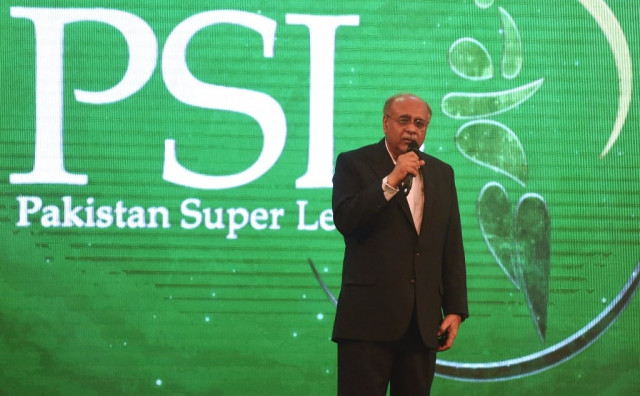Analysis: PSL3 sides as balanced as ever
All six teams go into tournament knowing they are capable of winning title

Taking inspiration: PSL’s decision to go with an NFL-style draft system is paying dividend as no clear favourite has emerged after the draft. PHOTO: AFP
Multan Sultans may be the new kids on the block but write them off at your own risk. Their canniest signing may have been that of bringing Wasim Akram into their backroom staff. The legendary left-arm pacer instantly brought not only the star power that can attract all the best players but also the invaluable knowledge of how to win the league, having done so with Islamabad United in the first edition.
Skipper Shoaib Malik leads a side that boasts a staggering amount of experience in the likes of Kumar Sangakkara, Imran Tahir, Sohail Tanvir, Ahmad Shahzad and Keiron Pollard. The team may be new, but the players wearing their colours certainly are not.
Add to that the potential of an all-Pakistan pace attack comprising of Muhammad Irfan, Junaid Khan, Umar Gul and Tanvir, and Multan Sultans may well be both the dark horse and the neutrals’ favourite.
Peshawar Zalmi won the last edition in front of a jubilant Gaddafi Stadium so it comes as little surprise that they have retained the core of their side. After all, why fix what isn’t broke?
Franchises finalise line-ups for PSL3
Shahid Afridi’s departure for Karachi Kings leaves a huge gap but the likes of skipper Darren Sammy and experienced stalwarts Mohammad Hafeez, Dwayne Bravo and Kamran Akmal are all more than capable of filling it; at least in terms of explosive hitting, if not in terms of crowd popularity.
In Hasan Ali they have arguably the finest limited-overs bowler in the world, in Shakibal Hasan arguably the world’s finest all-rounder.
Peshawar may have more match-winners than any other PSL team and are therefore the most dangerous team on their day.
After reaching both finals, Quetta Gladiators surely cannot be labelled the plucky underdogs anymore; even if they are yet to get their hands on the prized trophy.
Sarfraz Ahmed has proven himself to be one of the canniest leaders in limited-overs cricket and will be quietly confident of going one better, having acquired the services of hard-hitting all-rounders Shane Watson and Carlos Brathwaite. Yet, with the hit-and-miss nature of those two gentlemen, Quetta may have left themselves a little too reliant on a 37-year-old Kevin Pietersen. Rilee Rossouw and Anwar Ali may well be capable of providing some firepower in the middle and death overs but neither play international cricket any longer.
On paper, once again, Quetta look like one of the weakest teams. Perhaps fittingly, considering their tendency to punch above their perceived weight is what lends such charm to the PSL’s most liked team.
Under Misbah’s leadership, Islamabad name Raees vice-captain
Karachi Kings have a brand new skipper in Imad Wasim and a brand new champion in Shahid Afridi, but many would be salivating over the prospect of Muhammad Amir and Mitchell Johnson — the past and present of left-arm pacers — sharing the new ball.
Sentiment aside though, the signing of a 36-year-old Johnson may be ill-advised considering the conditions he will be working with; even if his limited-overs record in the UAE is quite impressive.
Babar Azam has shown he prefers the 50-over game to the other two formats but by shoring up one end, he can provide his batting partners the license to free their arms.
Yet it is hard to shake off the feeling that the Kings have, at best, stood still rather than move forward. Replacing Malik with Afridi would be an extremely inadvisable move in most people’s books right now and the departure of Pollard leaves more pressure on Ravi Bopara to start hitting early.
Islamabad United had quite the fall from grace in the second edition — going from first to fourth — and their aging squad was generally considered to the reason.
Faheem Ashraf, Luke Ronchi and JP Duminy are the biggest names to come into the side but Misbahul Haq may once again be relying on his bowlers to deliver the wins. Being able to call on the likes of Rumman Raees, Shadab Khan, Samuel Badree and Andre Russel surely makes his job that much easier though.
Last and least, at least judging by the two editions so far, are Lahore Qalandars; once again boasting a fearsome squad that has the familiar questions marks of inconsistency surrounding it.
Brendon McCullum is a T20 captain like no other in the world and the bottom side in both editions will fear no one. A batting line-up that also includes Umar Akmal, Chris Lynn, Fakhar Zaman, Aamir Yamin and Sunil Narine mean the only way to stop this side will be wickets.
When Lahore play, the runs are sure to once again flow but such is the nature of all those batsmen that scores over 200 and under 100 are both likely scenarios. The bowling department, once again, looks a little weak for Lahore.
Yasir Shah and Sohail Khan can both take wickets but are often expensive, which puts a lot of pressure on Mustafizur Rehman and Sunil Narine to prevent the leakage of runs.
It would be a huge surprise if they fail to make the play-offs, but then again, it was a huge surprise when they failed the first two times.
As things stand though, PSL’s decision to go with an NFL-style draft system is paying dividend. There is very little to separate the sides and as Quetta and Lahore have shown at opposing ends of the spectrum, it is very hard to predict where the teams finish.
Minute details, once again, will decide the fate of these six teams; may the best one win.



















COMMENTS
Comments are moderated and generally will be posted if they are on-topic and not abusive.
For more information, please see our Comments FAQ